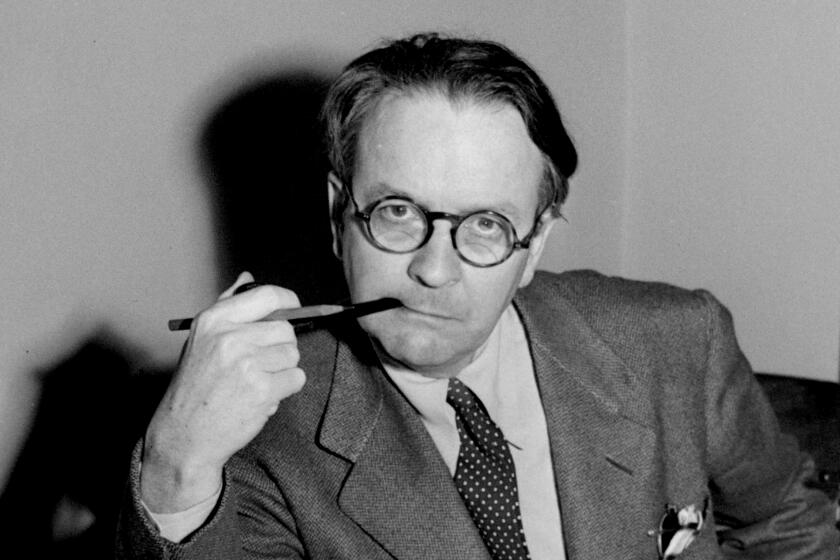Review: True crime on the reservation, starring an unlikely amateur sleuth
Sierra Crane Murdoch’s account of a murder case is about so much more
- Share via
Lissa Yellow Bird is one of the most fascinating characters I’ve ever read about — and she’s a real person.
She has been a terrible mother, a rebellious daughter, a drug addict, a drug dealer, a prisoner. She has also been the opposite of each of those things: devoted, attentive, sober, free. She smokes constantly, sleeps sparingly and has a generous heart. She is obsessive and relentless.
“Yellow Bird” follows her search for the killer of a man who went missing, a truck driver in the North Dakota oil industry. The account of her one-woman investigation by journalist Sierra Crane Murdoch is ambitious and vast, encompassing tribal politics and family histories, trips to look for a corpse and catfishing text exchanges with a suspect.
Because this happened in the recent past — Kristopher Clarke disappeared in 2012 and two men have gone to prison — anyone could Google the headlines. It’s Yellow Bird’s incremental fight that makes the book addictive, full of twists and turns and surprising choices.
I want to watch a movie of her story, but only if she’s the one who makes money from it.
Lissa Yellow Bird comes from generations of Native Americans who’ve been exploited by white people. That history is another thread in the book — the story of the Mandan, Hidatsa and Arikara Nation being swept into the Fort Berthold Indian Reservation, subject to the negligence and betrayals of the U.S. government. The cold North Dakota prairie was poor and forgotten until frackable oil was found beneath, at which point greedy white businessmen showed up in droves.
At this point I should acknowledge that I am a white lady writing about a white lady writing about a Native American lady. Murdoch waits until an author’s note at the end of the book to fully describe her relationship to the story — the years she has spent with Yellow Bird, beginning with a visit to Fort Berthold in 2011, when she was covering the oil boom for Colorado’s High Country News. To me, she seems well-suited to tell this story; your mileage may vary.
Clarke was a 29-year-old driving trucks on the reservation when he disappeared, working for his friend James Henrikson, who had a company that subcontracted with one of the tribes’ leaders. A complicated system of contractors and subcontractors allowed non-Natives to do business on the reservation. Eventually Yellow Bird’s efforts would help law enforcement expose kickback schemes.
In some ways it was like the oil booms of old: wildcats and roughnecks and speculators. In others, it looked like it might be justice delayed: These Native American tribes were finally going to get compensated for the resources on their land. In practice, however, some people got rich and others were left out entirely. “If colonization had begun the stratification of the reservation,” Murdoch writes, “the oil boom was finishing it.”
Clarke disappeared at the height of the boom, when the region was a blur of activity: new roads, temporary housing, environmental regulations ignored, drug use and violence rising. He was last seen with Henrikson at the office; later, Clarke’s empty truck was found off the reservation — keys inside, wallet and gun gone.
It was almost just another missing-persons case, in an area where jurisdiction was confusingly split among tribal, federal and state authorities. But when Yellow Bird saw a Facebook post by Clarke’s mother, she became obsessed. She’d stay up all night on her computer before going to work. She organized searches. Her methods could be brilliant but also shockingly unorthodox.
She was uniquely positioned as both an insider and an outsider. Because of her own experience with law enforcement, she knew her way around the agencies, many of which couldn’t, or didn’t, communicate with each other. As a former drug dealer and addict, she had insight into criminal networks. And as a member of the MHA Nation, she knew its history and had access to the tribal administration.
Yellow Bird soon concluded that Henrikson, a pumped-up dude, and his wife, Sarah Creveling, a polished blond driving a Bentley, were behind Clarke’s disappearance. They seemed to be getting rich from reservation contracts with a tribal leader named Tex Hall. “We need a strategy,” she told Clarke’s mother. “You know what I think? I think these guys built an empire around Tex, and the only way we’ll get inside is if we take it down, brick by … brick.”
Over several months, Yellow Bird found ways to keep people from forgetting about Clarke and Henrikson. She used social media; she created an alternate persona; she secretly partnered with a former investor of Henrikson’s and blanketed Fort Bethold with fliers outlining his long, previously unknown criminal past. This book reveals the extent to which it was Yellow Bird who was behind the efforts to keep pressure on Henrikson.
Even members of her own family didn’t understand her obsession. Yellow Bird had never met Clarke or anyone in his circle. There was nothing to connect her to this particular case. The question of why she became interested, stayed involved and built her life around this murder underlies the entire book. In the end I don’t think Murdoch has found an answer.
In some ways, Yellow Bird is a mirror of Murdoch herself. Why was the author so interested in this story? Why did she keep going back to North Dakota, sleeping on floors, trying to get people to talk to her? It wasn’t because of Clarke or Henrikson or someone she knew personally — it was something ineffable. Sometimes you just find a story that has to be told.
Murdoch reports the hell out of it, digging up text messages and conversations and business dealings and shifts in tribal power. She also gets deep into personal relationships and reveals their richness from all sides. It’s a remarkable accomplishment.
The book is also a little messy — sometimes the details overwhelm when what’s really needed is a better overview. But I like its sprawl, which allows this true-crime story — and it is a great true-crime story — to reach for broader horizons. It’s also a story about a place, the people who lived and tried and failed and died on it, and those who, despite generations of betrayals, are trying still.
Carolyn Kellogg is formerly a books editor of The Times and can be found on Twitter @paperhaus.
Yellow Bird: Oil, Murder, and a Woman’s Search for Justice in Indian Country
Sierra Crane Murdoch
Random House: 400 pp., $28
More to Read
Sign up for our Book Club newsletter
Get the latest news, events and more from the Los Angeles Times Book Club, and help us get L.A. reading and talking.
You may occasionally receive promotional content from the Los Angeles Times.









